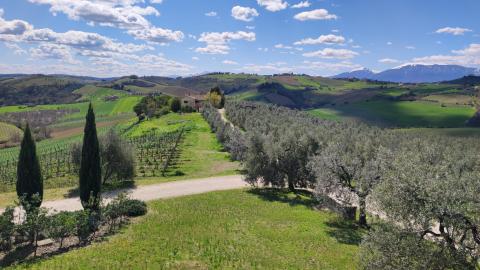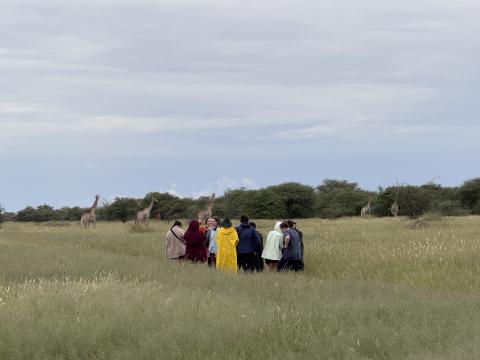Study Abroad at UNH COLSA
Thinking about exploring the world and gaining an education that tackles real global challenges? At the University of New Hampshire's College of Life Sciences and Agriculture (COLSA), you have a chance to be part of a community that actively rolls up its sleeves to find solutions.
Study abroad through UNH COLSA is your chance to learn from diverse ecosystems and cultures. Whether you're interested in conservation, sustainable agriculture or marine ecology, you'll have access to programs that will take your education beyond the classroom. Explore food systems in Italy, study wildlife in New Zealand or engage in fieldwork that makes a difference.
Join this journey where every new experience shapes you into a better version of yourself. With COLSA, not only do you gain valuable insights and skills, but you also become a part of a vibrant, science-minded community eager to support and inspire you. Embrace this adventure and see what you can accomplish while studying abroad with UNH COLSA.
Overview of Study Abroad at UNH COLSA
Studying abroad at the University of New Hampshire’s College of Life Sciences and Agriculture offers a unique educational experience. You’ll experience an immersive setting while addressing global challenges. Learn more about the benefits, available programs and requirements.
Benefits of International Education
When you participate in international education, you gain much more than just academic knowledge. Global exposure helps you understand different cultures and viewpoints, necessary for tackling global issues. It aligns with the UNH COLSA mission of addressing big problems through science.
You'll be inspired by being part of a community that seeks to make the world better. Whether you are exploring ecosystems or studying food systems abroad, COLSA encourages you to take science to new places.
University Programs and Exchange Options
UNH offers a variety of study abroad programs that suit different interests and goals. You can choose from semester-long to short-term options in places like Italy and Africa.
British Virgin Islands
Studying in the British Virgin Islands offers a unique opportunity to learn about marine ecosystems and conservation efforts. The region's rich biodiversity provides a living laboratory to understand tropical marine life.
Courses often focus on coral reefs, seagrass beds, and mangroves. You will engage in fieldwork that aids in conservation, taking science to new places. This experience not only deepens your understanding of these vital ecosystems but also connects you with a community focused on making a difference for the better.
EcoQuest New Zealand
The EcoQuest New Zealand program immerses you in the country’s stunning natural landscapes and diverse ecosystems. Your studies will include field-based research on topics such as forest ecology, marine biology, and environmental policy.
"This program is one of the reasons I decided to go to UNH. By traveling through the country and getting to have intimate experiences in different types of ecosystems, I remembered why I chose to enter the life sciences. I feel like that program made me a more thoughtful scientist who understands the importance of including different worldviews and perspectives in science to make it more impactful to a wider audience." ~ Kennedy McGrath '25
This program places you directly within habitats where you can learn solid scientific methods and make connections with local conservation efforts. The hands-on experiences will help you uncover new facets of your scientific curiosity and creativity. By studying in New Zealand, you're part of a community that seeks to unlock new understanding of the environment, enhancing both your knowledge and the world around you.
UNH In Italy

Experience the culture and history of Italy through the UNH in Italy program. Based in Ascoli Piceno, you will immerse yourself in the italian food system and agricultural practices.
This program combines classroom learning with visits to local farms and markets, giving you grounded insight into sustainable agriculture. By engaging with local experts, you’ll gain a new perspective on global food issues. Through this culturally enriching experience, you are not only learning but also discovering your potential to shape a new future.
Namibia
Namibia offers a distinctive study abroad experience by focusing on its unique ecosystems and wildlife conservation. Courses cover topics like biodiversity and wildlife management, and you will participate in fieldwork that places you at the center of these challenges.

In Namibia, you can expect to learn from real-life scenarios, understanding how local communities balance development and conservation. Your new skills and experiences will not only foster personal growth but also empower you to become a part of new solutions for the world’s pressing ecological problems.
Eligibility and GPA Requirements
Eligibility for study abroad requires you to be a full-time degree candidate at UNH in good standing. Generally, you'll need to maintain a minimum grade-point average to qualify for these programs. The GPA requirements can differ by program, ensuring that you are prepared academically for international study.
These requirements aim to ensure a successful and rewarding experience, allowing you to unlock new understanding and become a leader in your field. Learn what makes your education and the world better by meeting these standards and seizing this unique educational opportunity.
Why You Should Consider It
Studying abroad with the UNH College of Life Sciences and Agriculture (COLSA) offers unique learning experiences. You’ll explore new cultures and gain perspectives that enrich your education and personal growth.

